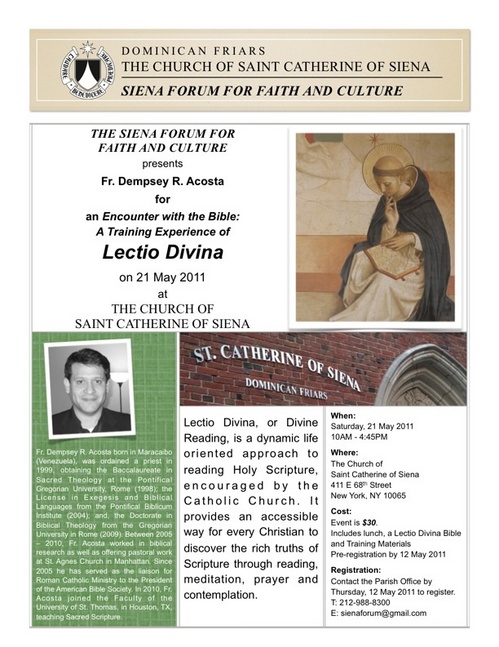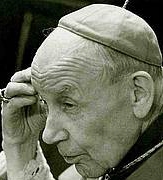Tag: scripture study
Pope tells Biblical Commission –and Church– not to reduce Bible to mere human genius
The Pontifical Biblical Commission is a group of theologians and scriptural scholars who help the Pope and the teaching mission of the Church exploring particular questions and concerns about the nature and reality of divine revelation and Christian life. The PBC is meeting this week in Rome led by Cardinal William J. Levada, Prefect of the Congregation for the Doctrine of the Faith; the theme is “Inspiration and Truth of the Bible.” Interesting. Did we forget that the sacred Scriptures were inspired by the Holy Spirit? One way of figuring out why something is important to the Pope or to sacred Magisterium is to be aware of the work done by these commissions. So, yes, there seems to be skepticism among the faithful that the Scriptures are revealed by God through the agency of human language. Recall, however, this is not the first time in salvation history that the Church has had to deal with this question: think of the various heresies from the early Church, the Renaissance, Reformation, and Enlightenment periods and even with the extreme use of the historical critical method of Scripture study. His Holiness reminds not only the professionally trained scholars but all of us that there can be in no way a reduction in how we interpret the Bible.
Here are the key points of what Benedict said to the PBC:
Pope Benedict a NY Times international bestseller
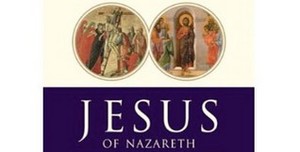 Pope Benedict’s book, Jesus of Nazareth, volume 2, internationally released on March 10 with 1.2 million copies in 8 languages.
Pope Benedict’s book, Jesus of Nazareth, volume 2, internationally released on March 10 with 1.2 million copies in 8 languages.
The New American Bible, Revised Edition
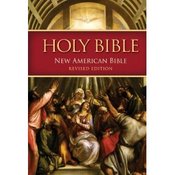 The other day there was some press, most of it inane, about the revised edition of the New American Bible.
The other day there was some press, most of it inane, about the revised edition of the New American Bible.
Scripture is to fill us head to toe
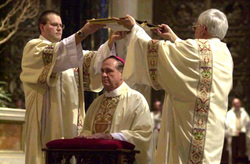 At a priest’s ordination as bishop the Book of the
At a priest’s ordination as bishop the Book of the
Gospels is held open over the man’s head by two deacons, a way to communicate that the
Scriptures are crucial to the life of the bishop and that Christ has infused
His Word in his heart and mind. Archbishop Timothy Broglio said this when he
ordained Bishop Spencer in 2010:
writings inspired by Almighty God and identified and transmitted over the
centuries by His Church must fill you from head to toe. You must be imbued with that word so
that whatever comes from your mouth will be an expression of what you have read
and heard. You will have a special
opportunity to deepen the faith of those to whom you are sent.” We are to be
similarly filled.
Lectio Divina conference sponsored by American Bible Society
![]() I am exceedingly happy to see the American Bible Society (ABS) responding so quickly to Pope Benedict’s encouragement to delve more deeply into sacred Scripture through the practice of Lectio Divina. The Pope spoke eloquently of Lectio Divina and its need for us to practice in his recent work on Scripture, Verbum Domini.
I am exceedingly happy to see the American Bible Society (ABS) responding so quickly to Pope Benedict’s encouragement to delve more deeply into sacred Scripture through the practice of Lectio Divina. The Pope spoke eloquently of Lectio Divina and its need for us to practice in his recent work on Scripture, Verbum Domini.
Catholics don’t celebrate Jewish holy days, why?
Not long ago a friend asked me why Catholics don’t celebrate
the Jewish holy days. Good question.
A response to the question as to why we
don’t celebrate the Jewish holy days would be along these lines: the Paschal
Triduum is the Christian Passover, the true Pasch. Even the Greek and Latin
name for Easter tells us that (as also the derivation of the name for Easter in
Spanish, French, Italian from the same root).
In one sense, Jesus’ teaching was
in continuity with Judaism (Mt 5.17: “Think not that I have come to abolish
the Law”); but he also in Matthew 5 puts himself forward as a higher Lawgiver
than Moses (“you have heard it said, but I tell you…”). I suggest
reading Rabbi Jacob Neusner’s book, A Rabbi Talks with Jesus, which makes this
point very clear. The Pope himself said in Jesus of Nazareth that Neusner’s book is
an excellent example of honest and reasoned argument between a believing Jew
and the Jesus of the gospels.
Continue reading Catholics don’t celebrate Jewish holy days, why?
Live the Word of God in Challenging Time: a bible summit
 Exploring the Word of God is an ongoing work for all Christians. Catholics have a good opportunity on June 26 to do some work on last Synod of Bishops on the Word of God. It is a good, necessary and beautiful thing to spend time with God as He’s revealed in sacred Scripture.
Exploring the Word of God is an ongoing work for all Christians. Catholics have a good opportunity on June 26 to do some work on last Synod of Bishops on the Word of God. It is a good, necessary and beautiful thing to spend time with God as He’s revealed in sacred Scripture.
Being deeply transformed by the Word of God: more on Lectio Divina
Renewed interest in lectio divina has given many people the opportunity to know Christ better. Our attention to this timeless prayer of the heart has been captured in a variety of publications such as by Trappist Father Michael Casey, Trappist Father Charles Dumont, Benedictine Archbishop Mariano Magrassi, Catholic biblical scholars Stephen Binz and Scott Hahn, to name just a few. In the last 2 years the archbishop of Toronto, Thomas Collins, has done the yeoman’s work in getting his flock to dig deeply in the Word.
100 years of the Pontifical Biblical Institute, Rome
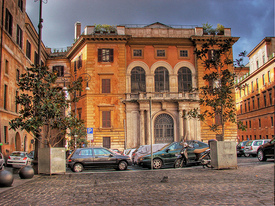 Here’s Benedict XVI’s October 26, 2009 address to the professors,
Here’s Benedict XVI’s October 26, 2009 address to the professors,
students and staff of the Pontifical Biblical Institute, on the centenary of
its foundation. Carefully note the key points the Pope raises for the authentic study of Scripture as Catholics!
Jesus, Illustrious Rector, Illustrious Professors and Beloved Students of the Pontifical
Biblical Institute
100th anniversary of the foundation of your Institute, desired by my holy predecessor
Pius X, in order to establish in the city of Rome a center of specialized
studies on sacred Scripture and related disciplines.
Cardinal Zenon Grocholewski, whom I thank for the courteous words he addressed
to me on your behalf. I likewise greet the superior-general, Father Adolfo
Nicolás Pachón, and I am happy to take the opportunity given to me to express
my sincere gratitude to the Society of Jesus, which, not without notable
effort, deploys financial investments and human resources in the management of
the faculty of the Ancient East, the Biblical faculty here in Rome, and the
headquarters of the Institute in Jerusalem.
who have consecrated their life to study and inquiry in constant listening to
the Word of God. I greet and thank the staff, employees and workers for their
appreciated collaboration, as also the benefactors who have made available and
continue to make available the necessary resources for maintaining the
structures and activities of the Pontifical Biblical Institute. I greet the
former students united spiritually to us at this moment, and I greet you
especially, beloved students, who come from every part of the world.
hundred years have gone by since the birth of the Pontifical Biblical
Institute. In the course of this century, it has certainly increased interest
in the Bible and, thanks to Vatican Council II, especially the dogmatic
constitution Dei Verbum — of whose elaboration I was a direct
witness, participating as theologian in the discussions that preceded its
approval — there is much greater awareness of the importance of the Word of
God in the life and mission of the Church.
communities a genuine spiritual and pastoral renewal, which above all has
affected preaching, catechesis, the study of theology and ecumenical dialogue.
Your Pontifical Institute has made its own significant contribution to this
renewal with scientific biblical research, the teaching of biblical disciplines
and the publication of qualified studies and specialized journals. In the
course of the decades several generations of illustrious professors have
succeeded one another — I would like to remember, among others, Cardinal Bea
— who formed more
biblical groups, as also many experts now present in an array of ecclesiastical
services, in every region of the world.
of yours that is dedicated to interpreting the biblical texts in the spirit in
which they were written (cfr Dei Verbum, 12), and that opens to dialogue with
the other disciplines, and with many cultures and religions. Although it has
known moments of difficulty, it has continued in constant fidelity to the
magisterium according to the objectives themselves of your institute, which
arose in fact “ut in Urbe Roma altiorum studiorum ad Libros sacros
pertinentium habeatur centrum, quod efficaciore, quo liceat, modo doctrinam
biblicam et studia omnia eidem adiuncta, sensu Ecclesiae catholicae
promoveat” (Pius PP. X, Litt. Ap. Vinea electa (May 7, 1909): AAS 1
(1909), 447-448).
at the same time a point of reference. Enriched by the experience of the past,
continue on your way with renewed determination, aware of the service to the
Church required of you, to bring the Bible closer to the life of the People of
God, so that it will be able to address in an adequate way the unheard of
challenges that modern times pose to the new evangelization. It is the common
desire that sacred Scripture become in this secularized world, not only the
soul of theology, but also the source of spirituality and vigor of the faith of
all believers in Christ.
therefore, growing as a high quality ecclesial center of study in the realm of
biblical research, making use of modern methodologies and in collaboration with
specialists in dogmatic theology and in other theological areas; may it ensure
a careful formation in sacred Scripture to future priests so that, making use
of the biblical languages and of the various exegetical methodologies, they
will be able to have direct access to biblical texts. In this regard, the
already mentioned dogmatic constitution Dei Verbum has stressed the legitimacy
and necessity of the historical-critical method, reducing it to three essential
elements: attention to literary genres; study of the historical context;
examination of what is usually called Sitz im Leben. The conciliar document
maintains firm at the same time the theological character of exegesis,
indicating the strong points of the theological method in the interpretation of
the text. This is so because the foundation on which theological understanding
of the Bible rests is the unity of Scripture, and this assumption corresponds,
as methodological way, to the analogy of the faith, that is, to the
understanding of the individual texts from the whole.
further methodological indication. Scripture being only one thing starting from
the one People of God, which has been its bearer throughout history,
consequently to read Scripture as a unit means to read it from the Church as
from its vital place, and to regard the faith of the Church as the real key to
interpretation. If exegesis also wishes to be theology, it must acknowledge
that the faith of the Church is that form of “sim-patia” without
which the Bible remains as a sealed book: Tradition does not close access to
Scripture, but rather opens it; on the other hand, the decisive word in the
interpretation of Scripture corresponds to the Church, in her institutional
organizations. It is the Church, in fact, which has been entrusted with the
task of interpreting authentically the Word of God written and transmitted,
exercising her authority in the name of Jesus Christ (cfr Dei Verbum, 10).
brothers and sisters, while thanking you for your pleasant visit, I encourage
you to continue your ecclesial service, in constant adherence to the
magisterium of the Church and assure each one of you the support of prayer,
imparting to you from my heart, as pledge of divine favors, the apostolic
blessing.
